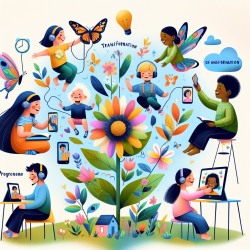As practitioners in the field of speech-language pathology, it is essential to base our interventions on evidence-based research. The study titled Coping strategies adopted by Iranian families of children with Down syndrome provides valuable insights into the adaptive mechanisms used by families. By understanding these strategies, practitioners can better support families and improve outcomes for children with Down syndrome (DS).
Key Findings
The qualitative study conducted by Gashmard et al. (2020) identified six primary coping strategies adopted by Iranian families of children with DS:
- Searching for Information
- Paying Attention to Children's Healthcare Needs
- Concentration on Spirituality
- Teaching Socially Appropriate Behavioral Skills
- Efforts to Increase Self-Reliance in Children
- Development of Family Support Circle
Practical Applications
Here are some practical applications for practitioners based on the study's findings:
1. Provide Comprehensive Information
Families actively seek information to understand and meet their child's needs. Practitioners should provide comprehensive resources, including medical, therapeutic, and educational information. Establishing a resource center or a digital library can be beneficial.
2. Focus on Holistic Healthcare
Children with DS often have additional health issues. Practitioners should adopt a holistic approach that addresses both physical and psychological needs. Regular check-ups and early interventions can prevent complications and reduce family stress.
3. Encourage Spiritual and Emotional Support
Spirituality plays a significant role in coping for many families. Encouraging families to engage in spiritual or religious practices can provide emotional relief and a sense of community support.
4. Teach Social Skills
Social skills training is crucial for children with DS to reduce stigma and improve social interactions. Practitioners should incorporate social skills training into their therapy sessions and provide guidance to parents on reinforcing these skills at home.
5. Promote Independence
Increasing self-reliance in children with DS is vital for their long-term development. Practitioners should focus on teaching daily living skills and encouraging parents to allow their children to take on responsibilities gradually.
6. Build a Support Network
Families benefit from a robust support network. Practitioners can facilitate support groups and connect families with community resources. Peer support can provide practical advice and emotional comfort.
Encouraging Further Research
While this study provides valuable insights, there is a need for further research to explore the coping strategies of families in different cultural contexts. Practitioners are encouraged to participate in or initiate research projects to expand our understanding and improve family-centered care.
To read the original research paper, please follow this link: Coping strategies adopted by Iranian families of children with Down syndrome.










